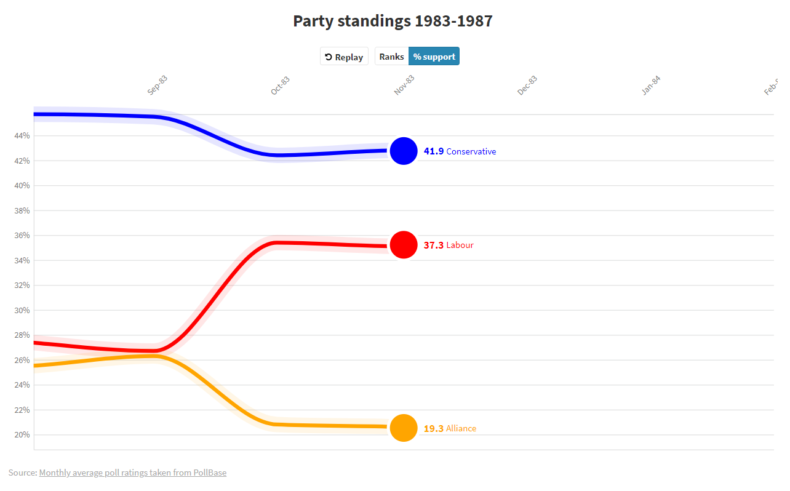1987 – the forgotten election

1987 used to be a pivotal election, frequently referenced. The birth of modern media management, the rise of computers in election campaigning, the death of the Alliance and a story of how one inaccurate leaked set of poll figures could panic a whole party; this was an election full of drama and long term significance.
But it is also now an example of how much evidence and knowledge dies if it predates the internet.
Because 1987 was the election when the exit poll got it wrong. But that was forgotten rather than wheeled out, tweeted about and dissected in the lull when people were arguing over the 2015 one, and then the 2017 one, as if there were no previous experiences relevant to mention.
Because 1987 was the election when there were many constituency opinion polls, including repeated ones in some seats. But that was forgotten in the debates over constituency polling in 2015 – with the debates carried out instead as if regular constituency polling in a general election was a new thing rather than something for which there is a goodly pile of historic data to look back to.Because 1987 was the election at the end of a Parliament when one of the leading reputable pollsters used to ask about voter’s views of personalities before asking voting intention, something omitted in the ignorance-inducing outrage in recent years that doing so must surely be a signed of rigged, push polling.
Because 1987 was also an election where a controversial Labour leader under remorseless tabloid attack overhauled their image in the public’s eyes massively, scared the Conservative Prime Minister, rescued his party from a possibly terminal cataclysm – and still lost.
Because 1987 was the first general election where computerised manipulation of data about individual voters first made its mark in campaigning. Yet those who were best at the technology – Labour with its pioneering email updates to target seats and the Alliance with its pioneering local voter databases – were the parties that lost. A warning about the limitations of technological excellence that should be a constant refrain when talking about the internet, big data or even Cambridge Analytica. But it is isn’t.
In all, 1987 should be our constant companion in talking about recent British politics.
But it isn’t.
So file 1987 along with Eugene Burdick, FWS Craig and Anthony Price in the curiously forgotten pile.
If you’d like to learn more about the 1987 general election, I’d recommend Political Communications: The General Election Campaign of 1987 and The British General Election of 1987. Second-hand copies of both should be available at reasonable prices from your preferred seller of second-hand books.
I don’t agree that the lessons about the limitations of computer use from 1987 should be borne in mind when considering Cambridge Analytica et al.. Hardly anyone had a personal computer in 1987 and the Internet hadn’t even been invented . Arpanet wasn’t wound up till 1990. It’s not like today when even babes in arms have smartphones.
Hi Deborah – if you follow through on the link in the post to https://www.markpack.org.uk/148592/electoral-commission-cambridge-analytica/ you can see the reasons for doubting how big Cambridge Analytica’s impact has been. The parallel with 1987 is that there’s a temptation often to over-play the impact of new technology on politics, and that’s happened whether the new technology was laser printers, computers, the internet, etc.
Hi Mark, Your article did ia great job at unpacking the data about Cambridge analytica and even paints a picture of ineffectiveness, so why do the parties pay so much money to them to campaign. Maybe they are more effective…….
1987 was not my first GE but it was my first experience of serious campaigning. And it was so serious! Elizabeth Gluck brought some campaign techniques from Programmes Ltd to get a +5.6% vote increase to 26% whilst the national share fell to 22%. Whatever happened to Elizabeth Gluck?
AAh 1987. I was Simon Hughes Campaign Manager and imagine my feelings when the BBC got our result wrong and broadcast that we had lost. Thankfully, their error did not stand, and Simon went on to a long and distinquished career. But for those of us back at Campaign HQ, it was smelling salts all round.
It was my first General Election as a party member. I don’t think I will ever forget it. I volunteered to help, was asked to turn up in a nearby village, was given a set of canvass cards and told to get on with it. I thought, bloody hell. My contact promptly left and I was all alone. Good day though.